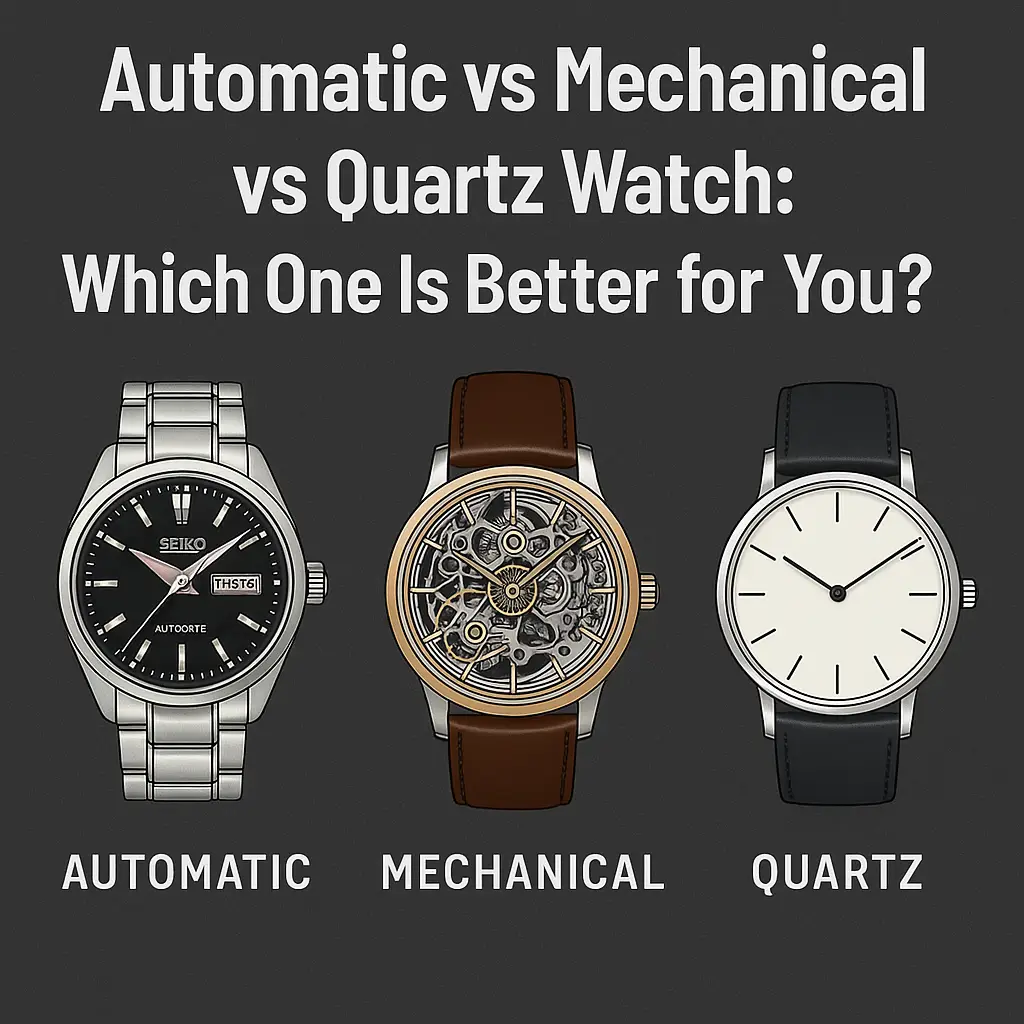Automatic vs Mechanical vs Quartz Watch: Which One Is Better for You?
Automatic vs mechanical vs quartz watch: These watch types differ by power source, maintenance needs, and accuracy. Choosing the right one depends on your preferences for convenience, tradition, or precision.
- Automatic watches are self-winding through wrist movement. They don’t need a battery but may stop if not worn regularly.
- Mechanical watches are manually wound and often chosen for craftsmanship and traditional appeal.
- Quartz watches are powered by a battery and use a vibrating quartz crystal to keep time. They’re the most accurate and require minimal maintenance.
| Type | Power | Accuracy | Maintenance |
| Automatic | Wrist movement | Moderate | Needs servicing every few years |
| Mechanical | Manual winding | Less accurate | Requires regular winding and servicing |
| Quartz | Battery | Highly accurate | Infrequent battery change |
🔍 Want to know which one fits your lifestyle best?
Scroll down to explore the pros, cons, and real-life benefits of each watch type.
What Makes Each Watch Type Unique?
Automatic Watches: Where Movement Powers Time
Automatic watches are mechanical at heart but come with a smart twist—they wind themselves using the motion of your wrist. As you move, a rotor inside spins, winding the mainspring. This means no daily winding, though if left unworn, they’ll stop after 1–2 days.
Notable features:
- Powered by wrist movement
- Rotor spins to wind the spring
- Manual winding also possible for backup
- Common power reserve: ~40–48 hours
- Visible mechanisms through caseback are a crowd-pleaser
📜 History Tip: Rolex perfected the 360° rotor system in 1931. Since then, brands like Eterna and Carl F. Bucherer have innovated for thinner designs and longer power reserves.
Mechanical Watches: Old-School Craft, New-Age Cool
Mechanical watches are the OG timepieces—completely battery-free and driven by craftsmanship. You wind them by hand, and they tick on through a balance wheel and escapement mechanism.
Key traits:
- Must be wound manually
- Often features “complications” like moon phases, calendars, chronographs
- Power reserve: 36–72 hours, sometimes more
- Popular among collectors and horology purists
🧠 Did you know? Mechanical watches often include jewel bearings—tiny rubies or sapphires that reduce friction. High-end ones use 17–23 jewels, with some inflated models claiming 40+ (often just for marketing).
Quartz Watches: Your Reliable, Accurate Everyday Hero
Quartz watches use a battery to power a quartz crystal that vibrates at 32,768 Hz. These vibrations are turned into electrical pulses, which drive the motor or digital display.
What makes them tick:
- Battery-powered; lasts 1–2 years (or longer with solar/kinetic tech)
- Ultra-accurate: ±15 seconds/month (or better)
- Low maintenance, lightweight, affordable
🌟 Pro Fact: The Seiko Astron (1969) was the world’s first quartz wristwatch—and it changed everything. Today, quartz tech powers most watches globally.
Side-by-Side Comparison
| Feature | Automatic | Mechanical | Quartz |
| Power Source | Wrist movement | Manual winding | Battery |
| Accuracy | Moderate | Least accurate | Most accurate |
| Maintenance | Every 3–5 years | Regular winding + servicing | Minimal (battery change) |
| Cost Range | $$–$$$$ | $–$$$$$ | $–$$ |
| Best For | Daily wearers who love tradition | Collectors and horology lovers | Everyday users, travelers |
| Style Factor | Classic-modern hybrid | Pure vintage craftsmanship | Clean, functional, and minimal |
Pros & Cons Breakdown
Automatic Watch
Pros:
- No battery needed
- Stylish blend of tech and tradition
- Visible movements (often via caseback)
Cons:
- Can stop if unworn
- Less accurate than quartz
- Requires periodic servicing
Mechanical Watch
Pros:
- Full mechanical purity
- Artisanal craftsmanship
- Often collectible and timeless
Cons:
- Least accurate
- Must be wound regularly
- Sensitive to environment (shock, magnetism)
Quartz Watch
Pros:
- Ultra-accurate
- Incredibly low-maintenance
- Most budget-friendly
Cons:
- Lacks “soul” for purists
- Battery replacement needed
- Fewer moving parts = less horological appeal
What Watch Matches Your Lifestyle?
| If You Are… | Choose This Type |
| Punctual, practical, and hate maintenance | Quartz |
| A romantic who loves tradition | Mechanical |
| A modern classic who wears watches daily | Automatic |
| A collector or gift-giver | Mechanical or Automatic |
| Tech-savvy but style-conscious | High-end Quartz |
Real-Life Use Cases & Watch Picks
🕺 True story: I wore a quartz Casio for years—never late, never thought about winding it. But when I got my first automatic Seiko, I caught myself checking the caseback more than the time.
💼 Popular Models to Consider:
- Quartz: Casio F91W, Citizen Eco-Drive, Timex Weekender
- Automatic: Seiko 5 Sports, Hamilton Khaki Field, Tissot Powermatic
- Mechanical: Orient Bambino, Nomos Tangente, Patek Philippe Calatrava
📎 Explore more:
Check out our top affordable luxury watches or this year’s must-have timepieces.
Final Verdict: Which Watch Should You Buy?
Still deciding between automatic vs mechanical vs quartz watch?
Here’s the bottom line:
- Want accuracy and ease? Go quartz.
- Love craftsmanship and rituals? Try mechanical.
- Want a bit of both with daily-wear practicality? Automatic’s your sweet spot.
🕰️ The best watch isn’t just what’s inside—it’s what fits your lifestyle and story.
Frequently Asked Questions
What’s the difference between automatic and mechanical watches?
Both are mechanical, but automatic watches wind themselves through wrist movement, while mechanical watches must be wound by hand.
Is quartz better than automatic?
Quartz is more accurate and needs less care. Automatic offers more craftsmanship and style appeal.
Do quartz watches last as long as mechanical ones?
With proper battery replacement, they last for years—but mechanical watches can last generations if maintained.
Are mechanical watches worth it?
Yes—if you value tradition, artistry, and don’t mind winding your watch regularly.

